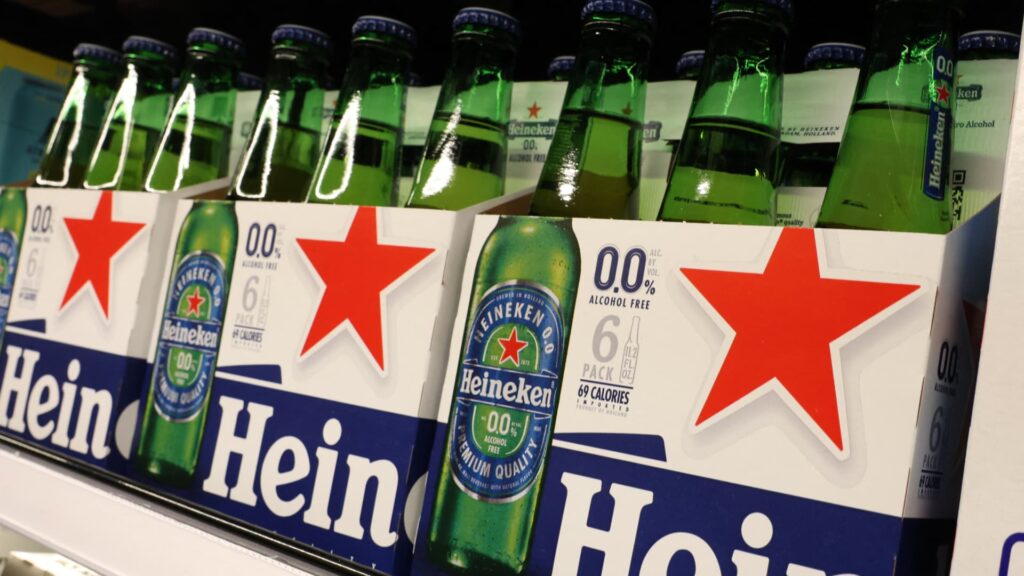
Heineken Tariff Concerns: Dutch Brewer Warns of U.S. Import Duty Impact
Heineken Tariff Concerns: Dutch Brewer Warns of U.S. Import Duty Impact
Published on April 19, 2025
Imported beer, including Heineken, for sale at a store in New York City on April 10, 2025. The Dutch brewer has raised concerns about the impact of new U.S. tariffs. (Image: Timothy A. Clary/AFP/Getty Images)
Table of Contents
Heineken has raised significant tariff concerns in its latest earnings report, warning that new U.S. import duties could force the company to adjust its spending and investment strategies. This marks a notable shift in the Dutch brewer’s position, after previously downplaying the potential impact of trade barriers on its business operations. The ongoing implementation of a 25% duty on imported canned beer and empty aluminum cans has emerged as a particular source of anxiety for the global brewing giant.
Heineken’s Shift on Tariff Concerns
The Heineken tariff concerns represent a significant reversal from the company’s previous stance. In its earnings report released Wednesday, the brewing company explicitly acknowledged the challenges posed by “recent tariff adjustments and potential increases” as it moves forward. This cautious tone signals growing apprehension about the trade environment affecting the beer industry globally.
This statement marks a substantial departure from CEO Dolf van den Brink’s February comments, when he described proposed U.S. tariffs as “relatively manageable” and suggested the beer industry was somewhat insulated from international trade disruptions due to its localized, capital-intensive nature. The emergence of these Heineken tariff concerns highlights the evolving reality of global trade tensions and their potential to impact even companies that initially believed they were well-positioned to weather such challenges.
Q1 Earnings and Revenue Growth
Despite the rising tariff concerns, Heineken reported first-quarter revenue growth that exceeded analysts’ expectations. The company maintained its full-year guidance, suggesting some degree of confidence in its ability to navigate the current trade environment. However, the acknowledgment of tariff risks within its earnings report indicates that Heineken is preparing for potential headwinds.

A Heineken beer production line. The company’s tariff concerns focus particularly on the 25% duty imposed on imported canned beer and empty aluminum cans. (Image: Representative)
The company’s ability to maintain its guidance despite these Heineken tariff concerns suggests that while the company is preparing for potential challenges, it believes it can implement strategies to mitigate the impact. These might include adjusting pricing, reconfiguring supply chains, or reallocating production resources to optimize operations under the new trade reality.
Declining Beer Sales Amid Market Challenges
While revenue growth remained positive, Heineken reported that its beer sales fell by 2.1% in the first quarter. CEO Dolf van den Brink acknowledged that the company had anticipated weaker beer sales due to a confluence of factors, including ongoing inflation, weak consumer sentiment, and currency fluctuations—with the tariff concerns adding another layer of complexity to an already challenging market environment.
Factors Impacting Heineken’s Beer Sales
- Inflation: Continuing price pressures affecting consumer purchasing power
- Weak Consumer Sentiment: Cautious spending patterns among beer consumers
- Currency Fluctuations: Volatility in exchange rates affecting international operations
- Tariff Uncertainties: New and potential import duties creating business uncertainty
- Market Competition: Increased competition from local and international brands
The decline in beer sales, combined with the emerging Heineken tariff concerns, paints a picture of a complex operating environment for the Dutch brewer. These challenges require careful navigation and strategic adjustments to maintain profitability and market position in key regions, particularly the United States where the new tariffs have direct implications.
The Aluminum Can Tariff’s Significance
At the heart of Heineken’s tariff concerns is the 25% duty on imported canned beer and empty aluminum cans. This specific tariff remains in effect despite a 90-day pause on other steep tariff rates targeting dozens of countries. The persistence of this particular trade barrier suggests it has special significance in the current administration’s trade policy, potentially creating a longer-term challenge for international brewers like Heineken.
For companies like Heineken that export canned beer to the U.S. market, this tariff represents a direct hit to profitability unless they can pass costs on to consumers or adjust their supply chain to mitigate the impact. The tariff concerns are particularly acute because aluminum cans represent a significant portion of Heineken’s packaging for the U.S. market.
| Product Category | Current Tariff Rate | Status | Impact on Heineken |
|---|---|---|---|
| Imported Canned Beer | 25% | In Effect | Direct impact on U.S. export sales |
| Empty Aluminum Cans | 25% | In Effect | Potential impact on U.S. production costs |
| Other Beer Products | Varied | 90-day Pause | Temporary reprieve, future uncertainty |
| Other Alcohol Imports | Varied | 90-day Pause | Limited immediate effect |
Beer Industry Tariff Responses
Heineken is not alone in adjusting its stance on tariff concerns. The company’s shift mirrors a broader industry trend, with other major brewers also recalibrating their responses to the evolving trade environment. Earlier this year, AB InBev, the world’s largest brewer and owner of brands including Budweiser and Stella Artois, similarly downplayed the threat of tariffs.
However, as with Heineken, the expanding global trade conflict has led to reassessments. Constellation Brands, which reported earnings last week, lowered its long-term guidance for 2027 and 2028, explicitly citing “the anticipated impact of tariffs” among its concerns. This industry-wide pattern suggests that Heineken’s tariff concerns reflect a growing recognition of trade barriers as a significant business challenge.
Current Stance: Concerns about “recent tariff adjustments and potential increases”
Current Stance: Reassessing as trade conflicts expand
Cited Factor: “The anticipated impact of tariffs”
Potential Changes to Investment Strategy
One of the most significant implications of the Heineken tariff concerns is the potential adjustment to the company’s capital allocation strategy. In its earnings release, Heineken explicitly stated that it remains “agile in our allocation of capital and resources” to navigate the fluctuating trade environment. This signals possible shifts in investment priorities, production locations, or supply chain configurations.
Potential Strategic Adjustments
Heineken may consider several approaches to address its tariff concerns:
- Localized Production: Expanding U.S.-based brewing capacity to reduce reliance on imports
- Alternative Packaging: Shifting from aluminum cans to bottles or other containers less affected by tariffs
- Supply Chain Reconfiguration: Sourcing aluminum or other materials from countries not subject to tariffs
- Pricing Adjustments: Selective price increases to offset higher costs in affected markets
- Product Mix Optimization: Emphasizing higher-margin products to compensate for tariff-related margin compression
These potential adjustments underscore the real-world implications of Heineken’s tariff concerns. Trade policies have direct consequences for business strategy, potentially reshaping investment patterns, employment decisions, and market focus for major international companies like Heineken.
Future Outlook and Market Implications
Looking ahead, the evolution of Heineken’s tariff concerns will likely depend on several factors, including the duration of current trade measures, potential expansion or contraction of tariffs, and the company’s success in implementing mitigating strategies. The 90-day pause on some tariffs creates a window of uncertainty, with the potential for either escalation or de-escalation in trade tensions.

The beer industry’s global nature makes it vulnerable to trade disputes. Heineken’s tariff concerns reflect broader uncertainties in international commerce. (Image: Representative)
For investors and industry observers, Heineken’s tariff concerns serve as a bellwether for the broader impact of trade policies on consumer goods companies. The company’s shift from confidence to caution highlights how quickly trade dynamics can change and affect business outlook, even for companies that initially believed they were relatively insulated from such pressures.
Market Implications of Heineken’s Position
- Investor Sentiment: Potential reevaluation of beverage stocks exposed to international trade
- Industry Consolidation: Possible acceleration of local partnerships or acquisitions to bypass tariffs
- Consumer Pricing: Potential price increases for imported beer brands in the U.S. market
- Production Shifts: Gradual relocation of production facilities to avoid tariff barriers
- Market Share Dynamics: Possible advantage for domestic producers less affected by tariffs
As Heineken navigates these challenges, its response will offer valuable insights into how global consumer goods companies can adapt to an increasingly complex trade environment. The company’s ability to maintain its full-year guidance despite these tariff concerns suggests a certain degree of confidence in its adaptability, but the acknowledgment of potential adjustments to capital allocation indicates that even well-established global brands must remain flexible in the face of shifting trade policies.
The contrast between this earlier statement and Heineken’s current tariff concerns demonstrates how quickly assessments can change when trade policies move from proposal to implementation. For Heineken and its industry peers, navigating this new landscape will require strategic agility and a willingness to reconsider long-established business models in response to evolving trade realities.
Published on April 19, 2025 | Updated on April 19, 2025






